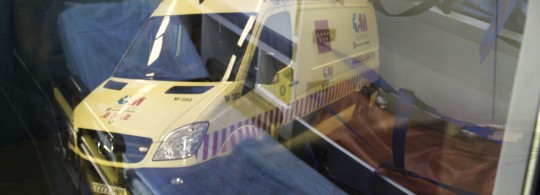
First Aid: What to do when you have a wound, bleeding, burns or poisoning
19 of November of 2015
You won’t think about it very often, but it is in those moments when you sustain an injury or burn yourself that you will wish that you had done a first aid course. It’s important to be prepared for these type of unexpected circumstances, and because of this we decided to look over the rules of what you should and should not do in these situations. Last week at the Ferrovial offices, we attended first aid workshops and after their resounding success, we want to share with you some important life lessons.
First aid lessons, what to do if…
You have a wound
- Before touching anything, wash your hands.
- Then, proceed to clean the wound with a drop of saline solution or with soap and water. Do not use alcohol because it is a bacteria fixative. Use hydrogen peroxide if the bleeding is severe.
- Clean from the inside out.
- If you have something embedded in the wound, don’t take it away, continue cleaning.
- Cover with a dressing, a strip which expands. Do not use cotton.
When you are bleeding
- First identify if it as a vein or an artery. What is the difference? The artery is the one that you touch to feel your pulse and the pulses coincide with the heartbeat. If it is an artery, this is more dangerous than the vein because it takes more time for the blood to clot. In the case of the veins once you apply pressure it will take just a few minutes to clot.
- Press hard and use your fingers to try stop the bleeding, preferably with gloves.
- Do not lift the dressing, you will lose the pressure
- In the case of a nosebleed, apply pressure to the area and avoid putting paper or cotton onto the wound
- It’s best not to apply a tourniquet, but if you have to in an extreme situation for example if you find yourself on a mountain adventure, do it every 8 minutes
You have a burn
- Place the area under cold water for 10 to 15 minutes.
- Do not apply ointments or home remedies. Don’t use cotton or gauze.
- Do not break the blister because it hydrates in and protects it.
- If the burn is very serious, don’t put water or other liquids on it.
- In the case of an electrical burn, cut off the electrical current at home or the place where you are.
You have poisoning
- First of all to prevent this from happening be cautious to avoid poisoning, keep under lock and key: cleaning products, insecticides, paints, glue, gases, medicines, …
- You can call the 24 hour phone line for the National Institute of Toxicology: 915620420.
- You must not induce vomiting nor give food, drink or medication.
You feel dizzy or have vertigo
First of all, what difference is there between dizziness and vertigo. If you feel dizzy you feel like you might faint, that you’re going to fall, in the second one you feel unsteady, that’s to say you lose your balance
- It is important to lay the person on the ground and lift their legs up
- Don’t give them anything to drink
You have got something in your eye, nose or ears
- For the eye, wash it with saline solution and if that isn’t enough, cover it over and go to the hospital.
- For both the nose and ears, wash with saline solution or tap water and go to the hospital to have the foreign body removed
In summary, many of the things that we habitually do are best avoided: stop putting alcohol and cotton wool on wounds and applying cream to burns and covering the affected area.





There are no comments yet